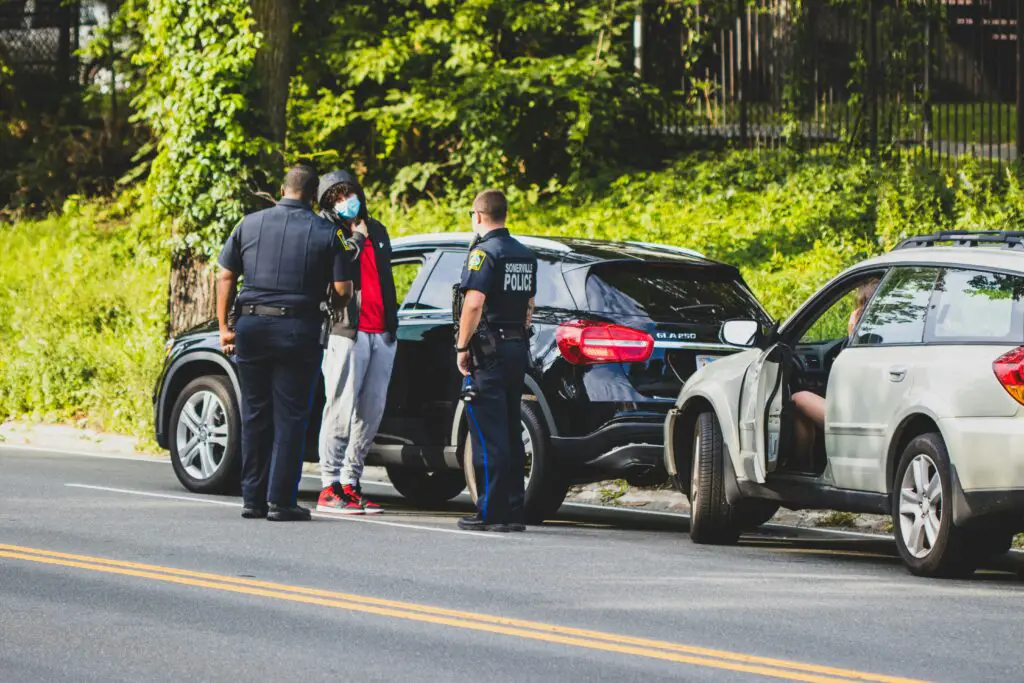We all have cut a few minutes off our walk by jaywalking across a city street occasionally. Most people jaywalk from time to time, often when there are no cars present. While it may seem harmless, legal consequences may depend on where you live. Today, we will address the question: “Is jaywalking illegal?” and discuss some of its consequences.
Viral Jaywalking Video
In this viral clip, a police officer threatens a mother after witnessing teens jaywalking. From the footage, we see three teens walking up to their house. As they enter, a police car pulls into the driveway, and two officers approach the house.
The teenagers’ mother opens the door to greet the officers. He demands that she bring the teenagers out for questioning. He continues, claiming that he saw them jaywalking. When the mother refuses, he threatens her with charges of obstructing an investigation. Again, the mother refuses, to which the man continues demanding and arguing with her.
What is Jaywalking?

Jaywalking is the general term for when pedestrians fail to follow pedestrian laws. Most typically, it describes when people illegally cross the road instead of using crosswalks.
In addition to illegal crossing, jaywalking laws may refer to crossing between cars, crossing streets diagonally, or disregarding “no pedestrian” signs. Jaywalking laws vary by state, with some fully decriminalizing it and others categorizing it as a misdemeanor.
Most police agree that jaywalking is so minor that they won’t deliberately seek it out during their daily rounds. With that said, some police, especially when in a ticketing mood, may be more inclined to catch you illegally crossing the road.
Is Jaywalking Illegal?

As mentioned, jaywalking is a relatively diverse legal concept. Some states consider it a criminal misdemeanor, while others consider it an infraction. Some states (California, for example) have gone further to decriminalize it entirely. For the most part, jaywalking laws remain in many states, but there has been a trend toward decriminalization in recent years.
Many countries lack jaywalking laws altogether. For instance, many Asian countries have no jaywalking laws, as pedestrians typically walk on crowded streets when safe.
Jaywalking is a unique topic. The intention behind these laws was to protect pedestrians from vehicular incidents, historically imposing lighter fines and punishments than for other offenses. In recent years, however, these laws have become more controversial. Many argue that authorities inconsistently enforce these laws, disproportionately impacting marginalized communities such as people of color and the homeless. Critics also contend that jaywalking laws allow police to stop and fine individuals for minor infractions.
Due to these reasons, many cities and states have been discussing trashing jaywalking laws altogether.
To sum up, many people wonder, “Is jaywalking illegal?” Due to the various laws throughout the country, giving a straightforward answer is not easy. Check your local state and city laws to clarify the status of jaywalking in your area.
Police Searches and Demands

Another interesting event in the video was the police officer demanding to question the children.
The U.S. Constitution grants us many rights as Americans. One of these rights is protection from unwarranted search and seizure under the Fourth Amendment. For police to legally question or search your property, they must have explicit consent or a formal search warrant.
As long as police don’t have a search warrant, you are within your rights to refuse questioning or a search.
Is Jaywalking Illegal? Verdict on the Video
In response to the video, many people have left comments saying, “Is jaywalking illegal?” and “Can police force you to leave your home?”.
In response to these great questions, viral TikTok attorney Ugo Lord has added some great insight. First, he says that police have the right to investigate if they believe a crime has occurred. In most states, jaywalking is considered a traffic citation or a crime.
Lord adds that police can request the teenagers to come out and talk. With this, he asserts that a request differs from a demand. Under their constitutional rights, the teenagers would be protected from a search unless the officers had a warrant.
Lord concludes that the police officers do not issue a lawful command. The kids can use their Fourth, Fifth, and Sixth Amendment rights to deny the request until they are legally required to comply.

